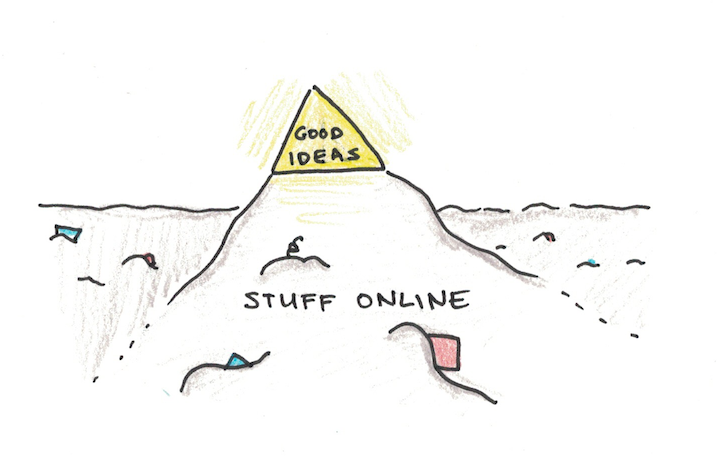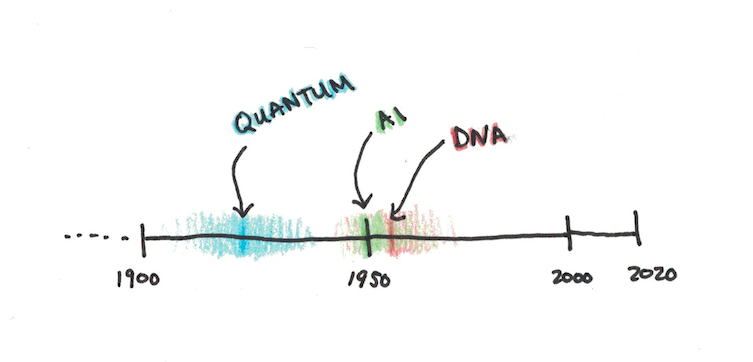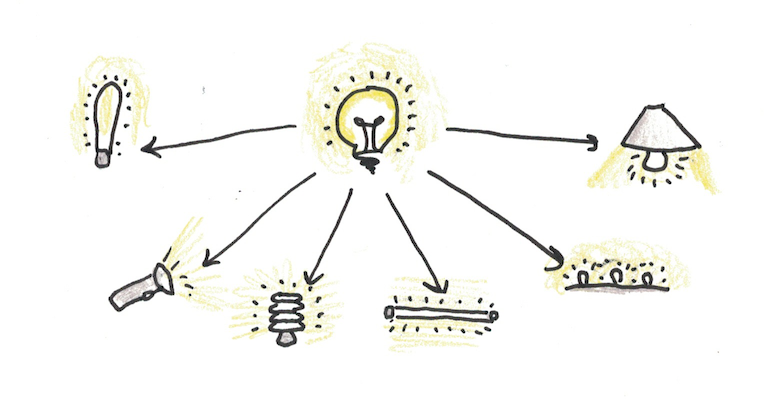The internet reachable by Google has over a million terabytes of data. Every minute 300 hours of new video is added to YouTube. In the time it took to read this sentence, at least 10,000 new tweets have appeared on Twitter.
We’re drowning in information, so it’s only natural to feel overwhelmed. Right?
I was asked about this in a recent podcast: how can you deal with information overload? On the surface, it seems like a completely reasonable question. There is so much more to read, watch and respond to that it can feel a bit overwhelming.
However, I think the explosion of data hasn’t really changed much about how we ought to stay informed. Most things aren’t worth reading. Of those that are, there’s an enormous amount of redundancy built in. The amount of truly original ideas worth learning is much, much smaller than statistics like I quoted above would lead you to believe.

On the (Relative) Paucity of Good Ideas
If ideas, as opposed to mere information, were truly exploding, we should be able to test this. Pick a few dozen important ideas, then ask when those ideas were first shared or discovered. If knowledge is growing exponentially, the majority of those should have been discovered in the last few decades.
Yet if you actually go through this exercise, the striking thing is just how old most of the important ideas are.
Quantum mechanics, that revolutionary physics that still baffles most of us? 100 years. DNA, the molecular secret of all life? Over forty years. The idea of artificial intelligence? Alan Turing spoke about it in nearly the same breath as he did in inventing a universal computer. Even the cutting edge “deep” learning strategies are largely based on algorithms that are decades older, but for which the technology wasn’t quite fast enough to make powerful until recently.

What ideas of the last decade or two will stand out as truly being worth learning in another hundred years? Blockchain? Quantum computing? CRISPR? Exciting developments to be sure, but the list is far, far smaller than the explosion in the Internet makes it first appear.
If anything, the rate of genuinely good new ideas worth learning may actually be slowing down, the opposite of what information overload suggests.
If Good Ideas are Rare, Why is the Internet So Big?
To be fair, the number of good ideas worth learning is still large enough that few can reasonably manage to understand more than the general outline of most of them in their lifetimes. However, this was also true fifty years ago, well before the idea of “information overload” had become popular.
If the explosion of “stuff” on the internet isn’t matched to an explosion in good ideas, then what’s all the stuff?
A cynical answer is to say it’s all noise, that nothing worth knowing appears online and we should all go back to reading the classics.
My own response is simply that for every good idea, there are many, many different ways of expressing it. That includes this very article you’re reading now—my own little take on some of the more fundamental facts around us. Different expressions of ideas can be useful, but they also include considerable redundancy.

As someone who is responsible for his fair share of redundant “stuff” online, I’m happy we live in a world where there are many different ways to teach and express fundamental ideas. I’m happy they can be reassembled and debated in so many different ways to allow interesting conversations.
But this prevalence of content isn’t the same as an overload of information.
What’s the Real Problem?
I think the real problem with the information available is that most people aren’t deeply interested in learning the important ideas. For them, the information represents entertainment, distraction, gossip or fashion. Knowing the deep and useful things isn’t high on the list.
The inverse of that, however, is that if you are really interested in understanding the world, the deluge of redundant manifestations of those ideas is super helpful. If you don’t understand an idea one way, you can read about it from a hundred different perspectives, one of which will likely click with you.
How do you know which ideas are truly important? This is also, largely, a fake problem. The important ideas are the ones that keep showing up, again and again, allowing you to understand the other things you’re learning and doing.
Ideas are important because of their frequency and utility. An idea that keeps being referenced when you’re learning something else is one worth learning on its own. Similarly, if understanding an idea is necessary to do or learn something else it matters more.
When I was doing the MIT Challenge, for instance, I think the Fourier Transform was introduced and explained separately in at least 4-5 classes, so that was a pretty big sign that it was important. Similarly, if you pick a less academic topic such as self-improvement, the terms habits, goals and motivation are going to show up again and again—best to understand these deeply if you want to make progress.
Cherish Good Ideas
If you start reading more, with the intention of really learning deep and useful things, it becomes increasingly obvious how rare good ideas actually are. I’ve written about many, but I’m quite confident I’ve never generated one myself.
Seen from this lens, the problem is not information overload but idea scarcity. When you find something truly deep and useful, explore and savor it fully, even if it requires a little more work at first.


 I'm a Wall Street Journal bestselling author, podcast host, computer programmer and an avid reader. Since 2006, I've published weekly essays on this website to help people like you learn and think better. My work has been featured in The New York Times, BBC, TEDx, Pocket, Business Insider and more. I don't promise I have all the answers, just a place to start.
I'm a Wall Street Journal bestselling author, podcast host, computer programmer and an avid reader. Since 2006, I've published weekly essays on this website to help people like you learn and think better. My work has been featured in The New York Times, BBC, TEDx, Pocket, Business Insider and more. I don't promise I have all the answers, just a place to start.